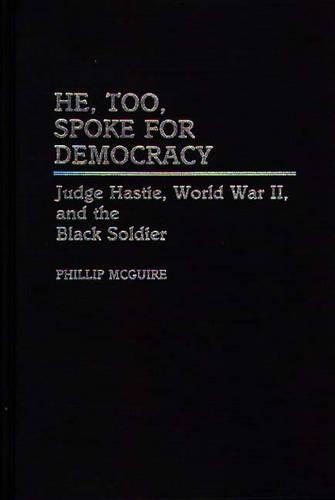
He, Too, Spoke for Democracy: Judge Hastie, World War II, and the Black Soldier
(Hardback)
Publishing Details
He, Too, Spoke for Democracy: Judge Hastie, World War II, and the Black Soldier
By (Author) Phillip McGuire
Bloomsbury Publishing PLC
Praeger Publishers Inc
11th March 1988
United States
Classifications
Tertiary Education
Non Fiction
355.008996073
Physical Properties
Hardback
176
Width 156mm, Height 235mm
454g
Description
McGuire's study fills a major gap in social histories of the Second World War by placing Hastie's role in proper historical perspective. He demonstrates that, although he is largely ignored in the published literature, Hastie did more to effect changes in the placement, training, and promotion of black soldiers than any other single individual in the history of the American armed forces prior to World War II. Throughout, McGuire makes liberal use of primary source materials and comments from soldiers and other key figures to reinforce his argument.
Reviews
A detailed and valuable account of Judge Hastie's role as a civilian aide in the War Department during the first two years of WW II. It reveals graphically the realities of the racially segregated US army. Hastie's efforts to bring about change, the determination of the Army leadership to remain segregated, and its duplicity and blatant institutional racism in doing so. Hastie resigned in frustration, but his work started the moves toward the abolition of military segregation culminating with President Truman's order in 1950. McGuire studied this episode in Judge Hastie's brilliant career for yeas and now presents these scholarly pieces in a single volume. Heavily documented, clearly written.-Choice
"A detailed and valuable account of Judge Hastie's role as a civilian aide in the War Department during the first two years of WW II. It reveals graphically the realities of the racially segregated US army. Hastie's efforts to bring about change, the determination of the Army leadership to remain segregated, and its duplicity and blatant institutional racism in doing so. Hastie resigned in frustration, but his work started the moves toward the abolition of military segregation culminating with President Truman's order in 1950. McGuire studied this episode in Judge Hastie's brilliant career for yeas and now presents these scholarly pieces in a single volume. Heavily documented, clearly written."-Choice
Author Bio
PHILLIP McGUIRE is Associate Professor of U.S. History at the University of North Carolina at Wilmington. The author of Taps for a Jim Crow Army, his numerous articles have appeared in such publications as the Journal of Social and Behavioral Sciences, Military Affairs, Journal of Negro History, Phylon, and The Researcher.
